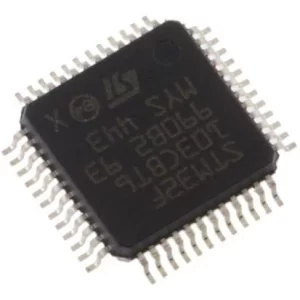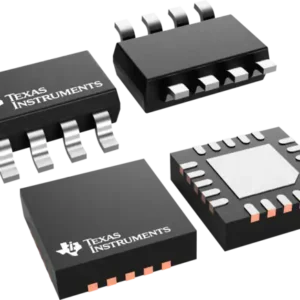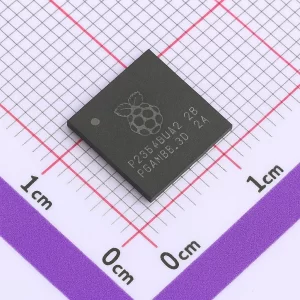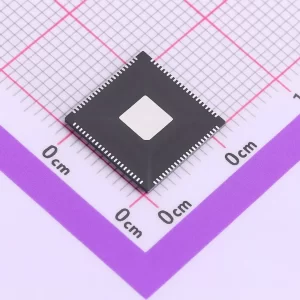MSPS003F4SPW20R MSPS003F4SPW20R – MSPS003 family 24-MHz MCU with 9 ADC channels in TSSOP-20
- TSSOP-20 with ~17 GPIO for practical wiring and debugging.
- Nine 12-bit ADC channels (to 1.5 Msps) for multi-sensor builds.
- Same low-power DNA and software feel as MSPM0C110x for easy migration.
Texas Instruments MSPS003F4SPW20R Microcontroller (TSSOP-20) Overview
MSPS003F4SPW20R slots into the MSPS003 family as a TSSOP-20 orderable aimed at cost-sensitive, leaded-assembly designs and education/rapid prototyping. Compared with MSPM0C1104, it keeps the same 24-MHz Arm® Cortex®-M0+, 16KB Flash / 1KB SRAM, and low-power DNA, while offering 9 external ADC channels (family-compatible 12-bit up to 1.5 Msps) and ~17 GPIO in a leaded package many teams already standardize on.
If your boards, fixtures, or contract manufacturer are set up around TSSOP footprints, this device minimizes mechanical change while preserving the familiar MSPM0-class software model and serial I/O (UART / I²C FM+ / SPI ≤12 Mbps)—plus ADC DMA support to shrink active time and energy.
Highlights (what’s unique about the TSSOP choice)
-
Leaded, serviceable form factor: TSSOP-20 is friendly for AOI/visual inspection, rework, and hand-solder in labs and low volumes—great for academia and pilot builds.
-
Proto-to-production continuity: the same footprint works across breadboard-style adapter boards, training kits, and costed production PCBs.
-
Balanced I/O without fine-pitch headaches: ~17 GPIO and 9 ADC channels give practical headroom for sensor hubs, indicators, and PWMs—without QFN/WQFN assembly demands.
-
Cost-optimized BOM: reuse existing TSSOP sockets, in-circuit test jigs, and assembly lines to shorten validation cycles.
Specifications
| Parameter | Value |
|---|---|
| Core | Arm Cortex-M0+ @ 24 MHz (SYSOSC) |
| Flash / SRAM | 16KB / 1KB |
| ADC | 12-bit, up to 1.5 Msps; 9 external channels (this orderable) |
| Interfaces | UART / I²C (FM+) / SPI ≤12 Mbps; DMA for ADC |
| Timers | Up to 14 PWM channels (family level) |
| GPIO | 17 (TSSOP-20), per device-comparison data |
| Supply / Temp | 1.62–3.6 V; –40 °C to +125 °C; ultra-low-power modes |
| Package | 20-pin TSSOP (PW) – orderable SPW20R |
| Base Family | MSPS003 |
Applications
-
Cost-effective control in white goods & tools — indicators, button/key scans, triac/MOSFET drive supervision, utility sensing.
-
Sensor aggregation nodes in TSSOP ecosystems — 9-ch ADC simplifies multi-probe or multi-rail monitoring.
-
Education / launchpad-style prototyping — easy soldering, socketing, and probing for labs and workshops.
-
Gateway/bridge boards — UART/I²C/SPI bridging, simple protocol translation, and logging.
-
General-purpose controllers — fans, buzzers, and LED drivers alongside a few analog channels.
Three quick features
-
TSSOP-20 with ~17 GPIO for practical wiring and debugging.
-
Nine 12-bit ADC channels (to 1.5 Msps) for multi-sensor builds.
-
Same low-power DNA and software feel as MSPM0C110x for easy migration.
Design guidance (tuned for TSSOP builds)
-
Education/lab friendly: gull-wing leads tolerate repeated rework; footprints drop onto common TSSOP-to-DIP adapters for benchtop bring-up.
-
Mixed-signal routing: dedicate one side of the device to ADC inputs with a quiet return; place PWM/CS/CLK escapes on the opposite side to reduce coupling.
-
Power integrity: standard decoupling close to VDD; add a small bulk capacitor near the MCU when many GPIOs/PWMs toggle.
-
Test access: keep UART or SWD on a 3–4 pad header; TSSOP pin access makes pogo-pin fixtures straightforward.
-
Thermal/common-mode control: wide ground pours and a short return to the sensor ground reference help the ADC maintain repeatability.
Positioning vs. MSPM0C1104 package options
-
vs. SOT-8/WSON-8: far more practical I/O (GPIO + ADC) and easier manual/low-volume assembly; slightly larger footprint.
-
vs. SOT-16: comparable I/O headroom, but TSSOP-20 is often the standard classroom/bench footprint, easing adapter and socket reuse.
-
vs. VSSOP-20 / WQFN-20: TSSOP is taller and less dense but shines in AOI/rework and when your factory lines already prefer leaded packages.
Power & firmware notes
-
Event-driven loops: pair ADC + DMA to burst-sample quickly, process, and drop back to low-power.
-
Crystal-less default: SYSOSC @ 24 MHz covers many designs; add an external reference only if your comms/timing budget demands it.
-
Run-current budgeting: plan around typical M0+ active plus peripheral current; shorten active windows with DMA and timer-driven scheduling.
Summary
MSPS003F4SPW20R is your TSSOP-native, budget-friendly path to 24-MHz mixed-signal control: nine 12-bit ADC channels, ~17 GPIO, familiar UART/I²C/SPI, and the low-power behavior you expect—delivered in a leaded package that simplifies labs, education, and cost-optimized production lines. If you want the MSPM0-class experience without changing out your TSSOP ecosystem, this is the one.
Specification: MSPS003F4SPW20R – MSPS003 family 24-MHz MCU with 9 ADC channels in TSSOP-20
|







